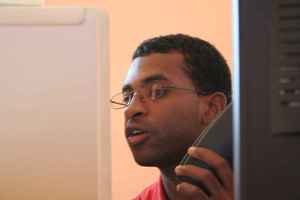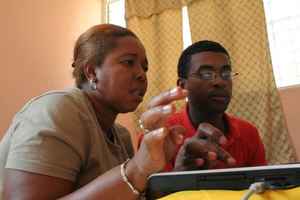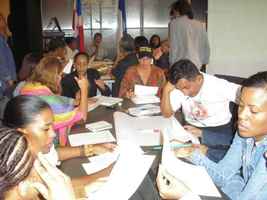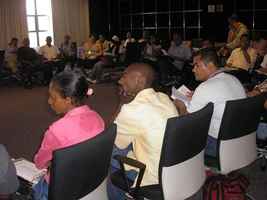The Urban Popular University: Regional Meetings
Report presented by Reynals, Cristina ( University of Buenos Aires-IAI-UPU ) and Surian, Alessio ( IAI - UPU ) at the P. Freire Forum, Sao Paulo, 2008
This work presents advances of the International Meetings of the Urban Popular University, an initiative of the International Alliance of Inhabitants, presenting first the objectives of the center, and secondly the experience of the meetings in the community center that occurred in Buenos Aires (Argentina) in May of 2006 and in Santo Domingo (Dominican Republic) on April 2007. As a central point, the specific objectives of the meetings entitled “Building the Urban Popular University in Latin America” were pointed out causing the participants to be motivated to produce new knowledge.
Finally, the preparations will in turn, put in the form of a debate the advances of the proposal of the methods used in the discussions, whose specificity is part of the persistent intent to share and come up with the interpretation with those who take part in the socio-educational process.
1. Objectives of the Urban Popular University
The UPU is an initiative of the International Alliance of Inhabitants (IAI), an international network of residents and organizations that fight for the right to housing, established within the framework of the World Social Forum of Mumbai in 2004. The IAI main campaigns are Zero Evictions and the establishment of the national level of rural property farms for the right to land and housing involving community organizations in the management of resources that result in agreements of cancellation of external debt. In order to strengthen these campaigns, it is indispensable to make an exchange of experiences and of good practices carried out by localized and national associations and the institutions whose concern is the social construction of the habitat. The UPU arose as a result of a study of feasibility that was carried out with the support of the Basque government that shows the necessity and aspiration of the different organizations that incorporate the IAI in order to:
- Raise consciousness of the habitat, issues of housing and the city by using research, publication, and training activities with an inclusive and transforming focus;
- To empower the volunteers and staff of associations of residents in areas of learning perceived as important for their work and struggles;
- To ensure that the volunteers and staff of associations have access to intercultural learning experiences that lead to critical and transforming knowledge in issues of habitat.
The UPU facilitates research activities, training, exchange of experiences, and publications in the following areas:
- Key issues in organization and training: particular attention to planning, evaluation, and development of policies; other areas of interest include communication, time and resource management, as well as participation;
- The overall importance as well as the small details with regards to issues of housing, and the ability to exchange experiences between partner organizations and develop collaborative relationships;
- The social construction of habitat and city rights. Key tensions, participants, and concepts including property security, durability of housing, sufficient space of the housing, access to water, health officials, etc.
- The role of housing social movements and their communities, political action on a local level as well as a regional level and within the framework of the processes of the World Social Forum and the Forum of Local Authorities.
The use of information and communication technology (ICT) and of the ability to use strategic applications of ICT takes on a key role as well in this framework within the respective organizations, as well as in the Internet and Intranet in the main sectors of activities of the UPU, training, research and investigative joint production, documentation, and systematization.
2. Regional Meetings of the UPU
So far two UPU regional meetings entitled: “Building the Urban Popular University in Latin America”, have taken place: the first in Buenos Aires, Argentina (May 2006) and the second in Santo Domingo, Dominican Republic (April 2007). A third meeting is scheduled for January 2009 in Belem, Brazil. The participants are:
a) Present or potential leaders of low-income neighborhoods, centralized groups of small business associations, communal banks, other organizations of women, youth and church groups, etc.;
b) Youths who have or have not graduated high school;
c) Hosts of local economic activities;
d) Within our educational option we seek to give equal opportunities regardless of sex, age, and type of organization (neighborhood and economic associations and organizations, etc.).
The intent of the regional meetings that go by the name of: “Building the Urban Popular University in Latin America” is to support the development of the ability of community leaders as agents of their own destiny and the development of their neighborhoods, with the capacity of governance and nomination, and to provide reflection on key themes that are directly linked to the needs and objectives of the IAI. They are complex objectives that require consistent and active participation of the various forces alive in a district or region. The UPU doesn’t seek to achieve for itself the development of these objectives but rather to contribute to this effort, generating and providing the broadest alliances and agreements possible. Nevertheless, we are aware that educational work isn’t neutral and that it is not unconnected to the great problems of a region or a country. Consequently, our educational alliances must be based on precise objectives and on a common vision of change. This is the conclusive component of the profile that the educational program wants to give to its graduates. In this effort, the educational program doesn’t seek as it’s primary objective to create new leaders. In the great majority of cases these leaders already exist and participate actively in the life of their communities. What we seek is to contribute to their optimal development, to mold their identity and to have them commingle with reality, awakening their sense of solidarity with a clear perspective on social transformation.
2.1 Specific objectives of the meetings
The regional meetings “Building the Urban Popular University in Latin America” have had three main objectives:
a) To bring about the development of the capacities of community leaders as agents of their own destiny and of the development of their neighborhoods;
b) To bring about the capacity of the leaders to govern and to nominate;
c) To encourage the reflection of key themes directly linked to the needs and objectives of the IAI and of the people’s movement.
The objectives of the learning process are:
a) To develop the capacity to relate the specific problems with their cause and consequences that they produce, and therefore, to offer alternative solutions that are viable from a point of view that is practical yet radical, in the sense of going to the root of the problems and of the solutions;
b) To manage the specific issue with reference to the topics related to the city, the land, and housing, to participate actively in the debate regarding these issues, to make proposals and negotiate with the corresponding authorities measures that are favorable to the population;
c) To promote the strengthening and accord of the different local participants generating among them synergies that are favorable to the improvement of the quality of life of the population;
d) To encourage self-esteem, cultural identity, and the moral values of the population on the horizon of a collective project of change.
In order to reach the outlined objectives the UPU identifies four components that the educational proposal has to have:
a) Regulations, systematization, and expansion in a collective form, of empirical knowledge of reality as well as experiences of communal organization and civic initiative;
b) The transfer of information, adequate knowledge and techniques to the needs of the learning objectives indicated, linking all of these to the expansion of knowledge and the skills related to the area in a way that guarantees a process of reciprocity and of mutual learning;
c) Design of specific educational proposals related to each local reality and with plans of development as a whole;
d) Development of educational mechanisms that allow people to favor the “appropriation” of local space where the educated are concerned (that is to say, that they see it as a totality and incorporate it as a perspective that gives order to the plan of action) using maps, land registries, tours of the district, etc. as well as its historical and sociocultural identity.
3. Types of themes discussed in the UPU meetings
A. ISSUES OF LOCAL DEVELOPMENT
Visualizing on the part of the participants the different local issues of their place of origin, similarities and differences, probable solutions.
B. SUSTAINABLE DEVELOPMENT
To critically plan and implement ways of promoting, favoring and/or increasing sustainable development in economic, social, political, and cultural areas along with social justice and gender equity;
To plan and implement ways to promote, favor, and/or increase the improvement of the habitat and the environment;
To identify, analyze and investigate the fundamental factors that come into play in sustainable local development, as well as the relationships among their different variables.These tasks are aimed at gaining an understanding of the process of development and to detect those variables that facilitate and obstruct the process;
To devise, implement, and evaluate with the different participants, proposals for plans of sustainable local development. To advise public and private institutions about the methodology of local development.
C. PUBLIC AND CIVIC MANAGEMENT
To identify the most significant actors and variables in order to guarantee govern ability within a democratic atmosphere, respect for the rights of citizenship, to participate actively and without restrictions, in the planning, execution, and evaluation of local governmental decision making;
To design and implement proposals for management models in accordance with the needs detected in the analysis;
To research the level of knowledge and skills of those who work in public service and monitoring of civic rights. To propose plans and implement them in order to overcome these deficiencies through communication and broadcasting programs;
To advise authorities, public officials, businessmen, and leaders about citizen rights and the different areas of development;
D. SUPPORTIVE ECONOMY
To research and know the roots and present possibilities of the supportive economy as a tool to promote local development, in the economic, political, and cultural sphere;
To design implementation proposals of the cooperative system in the different areas of industry, commerce, culture, and social organization. Being able to implement and evaluate the results and to suggest disciplinary actions.
4. A way of assessing the meetings
There are activities that traditional methodical treachery denies, silences, alienates, while modeling the person who is a teacher, nurse, student, patient, or investigator. The social processes of work make overbearing and deadly forms natural to relate to, dehumanizing and ignoring the collective body. The meeting led by reasoning allows one, on the other hand, to construct bridges between the distinct positions and places that each worker or occupies, thus discovering the hidden logic that permeates them, that places them right in the center of “tragic traps”. (Ulloa, 1995 in Cuadernos de Instrumentos 1: La coprodUPUión investigativa y sus materialidades. [Workbooks of Instruments1: Investigative Joint Production and Their Material Aspects.] Notes about a method of knowledge in a new age 2).
In the meetings a component within the process of knowledge production is illustrated, which emphasizes the possibility of representing the space of reflection as well as living space in the neighborhoods where the experience of the participants is the central purpose through the discussions. The following are some comments made by attendees of the second meeting:
“… I’m a cabinetmaker, but since 2002 I’ve been fighting for people in my community who survived an eviction thanks to a Special Communities Program, we toured the city, identified the problems and then the communities became part of the program as assigned by the meeting with the community, determining that problems be solved first. We had training workshops and we were creators of our struggle. We came up with the idea to prepare a law that would prohibit a community that belonged to the program from being expropriated. 686 communities became a part of the program. The most important steps are training, knowing the laws, and being defenders of the community…” Jorge, Puerto Rico, Second Meeting UPU.
“…my interest is to learn more, I have two children, and I’m pregnant and married. I like sweets and everything that comes from the sea. In the neighborhood the problem of people being evicted worries me. I’m a teacher, and I see that people don’t pay attention, and I make an effort to make people aware…” Sara, Brisa Group Santo Domingo, Second Meeting UPU.
The richness of the meetings doesn’t reside only in the exchange of experiences of those present, but rather in the appropriation and production of knowledge visible in new responses, but above all, in new questions.
“…I live with my girlfriend, I have three children, I like music, I love the traditions of my country, the tango , the cumbia , the valsillo , merengue , salsa , and ranchera . We, the forgotten, marginalized poor, turn to action en masse to encroach upon unoccupied plots of land making settlements. In Peru there is political violence and breaking up of the people’s movement. They used to brand us terrorists. With the experience of FEDEVI we have strengthened ourselves, we’ve turned to plumbing consultants, legal advisors, and on January 28, 2007, the federation emerged in Peru. The IAI is beginning to be known, and we want to launch Zero Eviction because in our country there is a lot of corruption with judges who benefit the real estate agencies, and they leave nothing for the residents…” Nicanor, Peru Second Meeting UPU
“…I’m single, I like chocolate, dancing, creating things with my hands, drawing, painting, fighting to get rid of the municipal dump, and even going as far as building housing. I promote health, I’m a community educator, I work in women’s economics, for women’s equity, the right to sexuality and the fight against violence towards women…” Maria de los Angeles, Mexico, Second Meeting
1. For more information see http://esp.habitants.org/universidad_popular_urbana
2. International Agreement between the Gino Germani Research Institute of the Faculty of Social Sciences of the University of Buenos Aires and the International Alliance of Inhabitants through the Urban Community Center- Res. (CD) No. 513 of May 30, 2006.
Logo of the Research Team UBACyT S015: S/T Work of the artist Berta Teglio, 2002.
Regarding: Alberto L. Bialakowsky, Cristina Reynals, Maria Ignacia Costa, April 2007






